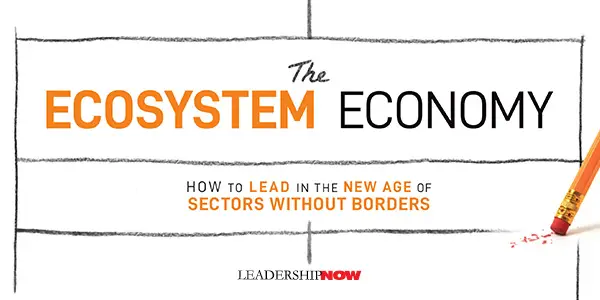 |
 |
02.10.23

The Ecosystem Economy
IN THE BEGINNING, as civilizations grew and became more advanced, work was organized around specialized lines of work. These sectors of work, like the mining, textile, or glassmaking industries, thrived with their own supply chains, expertise, and proprietary distribution. And this is basically how we think of business today. But that is changing. McKinsey partners Venkat Atluri and Miklós Dietz illuminate that change in The Ecosystem Economy. The borders between sectors are dissolving. Sectors like construction, real estate, automotive manufacturing, financial services, and health care have been thought of as distinct categories, each operating in its own spheres. Today we see businesses organizing “into new, more dynamic configurations, centered not on the way things have always been done, but on people’s needs.” Businesses form ecosystems by collaborating with one another—by sharing assets, information, and resources—and ultimately creating value beyond what would have been possible for each of them to achieve individually. The term business ecosystem has been used in the past generally to refer to relationships between one organization and its clients. The ecosystem economy that the authors refer to here goes much deeper than that. More like alliances between organizations that pull together the steps in a customer’s journey. Even if each step in that journey is fulfilled or managed by a different company, the ecosystem integrates them into a single platform, so that from the customer’s perspective, it’s all one experience, one journey. In other words, if an ecosystem can help consumers through the most arduous step on their journey, they will be more likely to trust the broader ecosystem with the rest of their needs. Tencent, Apple, and Google are all examples of economic ecosystems. Ecosystems are reshaping the world around us. The question is, how do we adapt and participate in this ecosystem economy? The two questions we need to be asking first are: Where will you compete now? And what should you do to evolve your value proposition? To answer these questions, the authors say, “you will need to vastly expand your scope—and shift the nature of your planning. You need to fundamentally rethink how you define your customers’ needs, your customer base, your industry, your proposition, and the competitive landscape.” The book provides examples of how to begin to work through this. As you do this, other questions begin to take shape, like, will you build the new ecosystem yourself? Will you participate in someone else’s ecosystem? Or a little of both? Then you need to transform your organization from within. You will need to rethink your approach to your organizing and operating model, talent, performance management, the underlying culture, and supporting infrastructure. They boil the lessons of their ecosystem playbook processes and recommendations down to ten principles which I’ll just list here:

Posted by Michael McKinney at 07:39 AM
|
BUILD YOUR KNOWLEDGE
 

How to Do Your Start-Up Right STRAIGHT TALK FOR START-UPS 
Grow Your Leadership Skills NEW AND UPCOMING LEADERSHIP BOOKS 
Leadership Minute BITE-SIZE CONCEPTS YOU CAN CHEW ON 
Classic Leadership Books BOOKS TO READ BEFORE YOU LEAD |